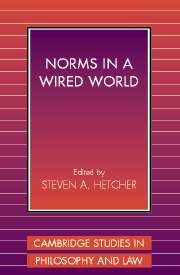Book contents
2 - Rational Norms
Published online by Cambridge University Press: 05 June 2012
Summary
Now all forms of community are like parts of the political community; for men journey together with a view to some particular advantage, and to provide something they need for the purposes of life.
AristotleIntroduction
While Chapter One explicated the essential requirements for a norm, it did not explicitly appraise the rationality of the acts of conformity that make up the norms. This chapter does. The next step, taken in subsequent chapters, will be to make an appraisal of the morality of the acts of conformity making up moral norms. These analyses will then be integrated to better understand the role of norms and customs in particular real-world legal and policy debates.
On some accounts, the term rational norm is an oxymoron as the element of raw conformity necessary for norms to persist is thought to be in tension with the reflection and calculation necessary for rational action. In fact, however, many norms are best viewed as deep expressions of the heights to which our rationality may attain. Other norms do indeed appear to be hopelessly irrational.
The previous chapter argued that conformity is necessary for norms to exist. Norms are maintained in groups and societies because people conform to the behavior of other people. There is a difficulty with the notion of conformity, however. As it is often understood, conformity amounts to blind following or rote imitation of the behavior of others. Such a model of human behavior is clearly in tension with the rational choice model.
The Chicago sociologist James Coleman characterizes this tension in the following manner: “Especially for theories based on rational choice, invoking a norm to explain behavior constitutes an almost diametrically opposed approach.”
- Type
- Chapter
- Information
- Norms in a Wired World , pp. 38 - 78Publisher: Cambridge University PressPrint publication year: 2004

